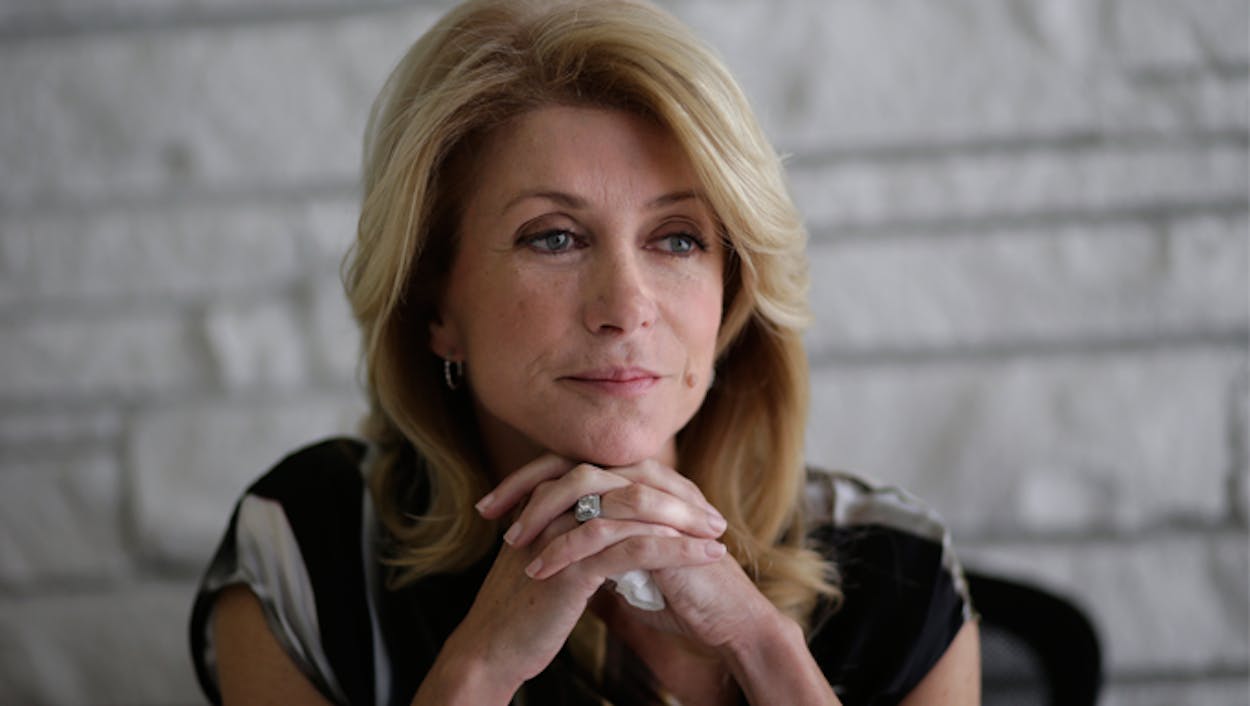When last we saw Wendy Davis in the media spotlight, she was conceding the governor’s race on election night, having lost to Greg Abbott by 20 points.
Since then the former city council member and state senator from Fort Worth has remained mostly out of public view, as is customary for losing candidates and especially those who lose so decisively.
But this week we’ve seen the beginning of Davis’s public reemergence, in friendly interviews with Rolling Stone and MSNBC.
So, what has she been up to? Davis is reportedly launching some kind of effort to get more young women involved in politics. But the headline quote from the Rolling Stone interview was about the future: “I do hope to run again. … I have no particular path in mind at this point. I am simply keeping myself open for opportunities that make sense.”
I suppose that isn’t surprising. Politicians are often reluctant to rule out another run for office. Still, unless she wants to serve in the Texas House or return to the Fort Worth City Council, it’s not clear what race she could plausibly enter. Even her old Texas Senate seat—now held by Republican Konni Burton—would be a tough win for her. Running for governor again or another statewide office would seem a fool’s errand. At the moment, Davis’s political prospects in Texas are pretty bleak.
But the quote in Davis’s Rolling Stone interview that really caught my eye was this one (italics are mine):
There are several things I would do differently. When you get into a race of that magnitude – and it was my first experience on a platform of that magnitude – you tend to have to rely on a team of people around you to help shape everything you do, from your day-to-day logistics to your speeches to your priorities and your messaging. And I felt like as the months ticked by, my voice was getting lost. I can’t really – and certainly don’t – point fingers at anyone for that. It just happens to be a side effect of that size of an organization, and the quickness with which we had to put an organization like that together. But I do believe that women wanted to hear more from me on that issue. We sort of assumed, well, everyone knows where I stand on choice and on reproductive autonomy – let’s move on to other issues so they can see the other priorities I have as well, like public education, for example. But I think people really did want to hear more about [reproductive rights] in the election, and I certainly want to talk about it. It’s been one of the most freeing parts of losing the election and not being an office-holder or a candidate right now: I can focus on exactly the things that matter to me, and spend my energies doing that.
Davis isn’t the first candidate whose voice got lost in a campaign—whose actions and statements seemed to contradict who they were and what they stood for before the race. In fact, it seems to happen quite often to losing candidates, especially those running their first statewide or national race.
It happened to Rick Perry. In 2011 a voter in Iowa asked Perry to name the books that have shaped his life, and the candidate talked about Friedrich Hayek, who famously wrote “The Road to Serfdom.” I’m sure that’s perfectly fine reading material, but does anyone really think that Hayek shaped Perry’s life or wrote his favorite book? Of course not. Instead of giving a human answer, he went with what was en vogue at the time, what he thought might poll well, what his consultants probably told him meshed with his campaign message. It was clear then that Perry was finished.
We saw it happen to Davis too. In the fall of 2013, just weeks after declaring her candidacy and months after her famous filibuster, Davis suddenly stopped using the word “abortion.” At times she had to contort her rhetoric to avoid saying the word—even when talking about women’s health issues. (This happened most hilariously when Davis gave a speech marking the one-year anniversary of the filibuster, which in the Davis campaign’s revisionist history, wasn’t about abortion but about taking on “Austin insiders.”)
It seemed clear that some consultant had decided abortion didn’t play well in Texas, so the word itself became verboten.
Now, I’m not saying Davis should have made abortion a central part of her campaign. Abortion was never going to be her main issue. That’s not the point. But it’s rather incredible that she wouldn’t even use the word—as if Texans would suddenly forget Davis’s position if she never used the A-word.
Davis always faced long odds. There was little she could have done to win the race. But if you’re likely going to lose, why not lose being true to who you are?
She shouldn’t have been afraid to talk about abortion. From the Rolling Stone quotes, it seems she now realizes that.
Why do candidates subjugate themselves to consultants? Campaign staffers are supposed to help take what a candidate wants to say and figure out how best to say it, package it and sell it, and whom to say it to. The best candidates know who they are, know why they’re running and what they want to say. Ted Cruz in 2012 is a good example.
But when candidates let consultants go beyond messaging and strategy, and allow consultants to tell them what to say and what not to say, well, that’s the first sign a campaign is doomed.
Why does this happen? Why do smart, accomplished politicians allow their campaign staff to obscure their voice? Is it a lack of confidence or rookie mistakes? It baffles me. (If you commenters have any theories—or first-hand experiences—on this, I’d love to hear them.)
Meanwhile, if Davis does run for office again, perhaps she’ll do things a little differently next time.






